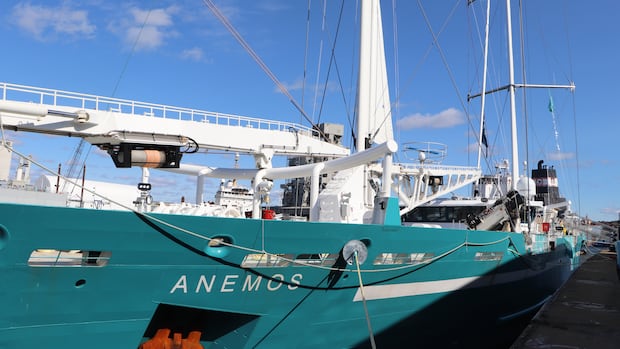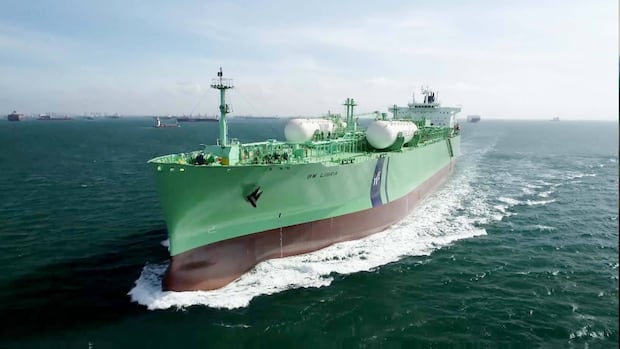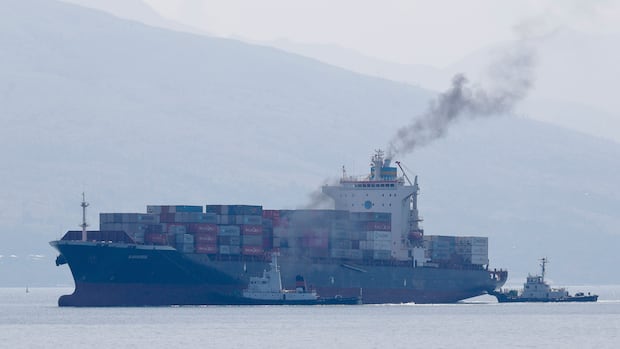The United States has succeeded in blocking a global fee on shipping emissions as an international maritime meeting adjourned Friday without adopting regulations.
The world’s largest maritime nations had been deliberating on adopting regulations to move the shipping industry away from fossil fuels to slash emissions. But U.S. President Donald Trump, Saudi Arabia and other countries vowed to fight any global tax on shipping emissions.
The U.S. had threatened to retaliate if nations support it. Trump urged countries to vote “No” at the International Maritime Organization (IMO) headquarters in London, posting on his social media platform Truth Social on Thursday that “the United States will not stand for this global green new scam tax on shipping.”
The IMO is the United Nations agency that regulates international shipping.
Saudi Arabia called for a vote to adjourn the meeting for a year. More than half of the countries agreed.
“Now you have one year, you will continue to work on several aspects of these amendments,” Arsenio Dominguez, secretary general of the IMO, said in his closing remarks. “You have one year to negotiate and talk and come to consensus.”
WATCH | See what a wind-powered cargo ship looks like:
See what a wind-powered cargo ship looks like and learn why some importers prefer it
Some companies have found a unique way to reduce their carbon footprints by importing products using a sailing cargo ship, one of which recently stopped in Quebec City.What this means for climate change
Ralph Regenvanu, minister of climate change for the Pacific island nation of Vanuatu, said the decision is unacceptable, “given the urgency we face in light of accelerating climate change.”
If the green shipping regulations were adopted, it would have been the first time a global fee was imposed on planet-warming greenhouse gas emissions. Most ships today run on heavy fuel oil that releases carbon dioxide and other pollutants as it’s burned.
“The delay leaves the shipping sector drifting in uncertainty. But this week has also shown that there is a clear desire to clean up the shipping industry, even in the face of U.S. bullying,” said Alison Shaw, IMO manager at Transport & Environment, a Brussels-based environmental non-governmental organization.
Shipping emissions have risen over the past decade to about three per cent of the global total as trade has grown and vessels use immense amounts of fossil fuels to transport cargo over long distances.
In April, IMO member states agreed on the contents of the regulatory framework, with the aim of adopting the “Net-Zero Framework” at this week’s London meeting.
Adopting the regulations was meant to demonstrate how effective multilateral co-operation can deliver real progress on global climate goals, said Emma Fenton, senior director for climate diplomacy at a U.K.-based climate change non-profit, Opportunity Green. Delaying the process risks undermining the framework’s ambitions, they said.
WATCH | Reshaping the shipping industry for a sustainable future:
Reshaping the shipping industry for a sustainable future
Shipping is the foundation of the global economy, but for years it sailed under the radar for its huge carbon footprint — but not anymore. CBC’s Chris Brown travels to Denmark to learn more about efforts to push the industry into a sustainable future.What the regulations would have done
The regulations would set a marine fuel standard that decreases, over time, the amount of greenhouse gas emissions allowed from using shipping fuels. The regulations also would establish a pricing system that would impose fees for every ton of greenhouse gases emitted by ships above allowable limits, in what is effectively the first global tax on greenhouse gas emissions.
The IMO, which regulates international shipping, set a target for the sector to reach net-zero greenhouse gas emissions by about 2050 and has committed to ensuring that fuels with zero or near-zero emissions are used more widely.
“What matters now is that countries rise up and come back to the IMO with a louder and more confident yes vote that cannot be silenced,” said Anaïs Rios, shipping policy officer for Seas At Risk. “The planet and the future of shipping does not have time to waste.”

